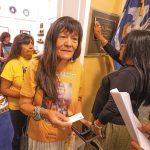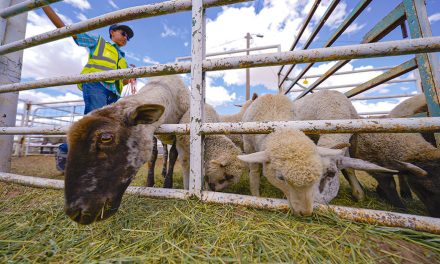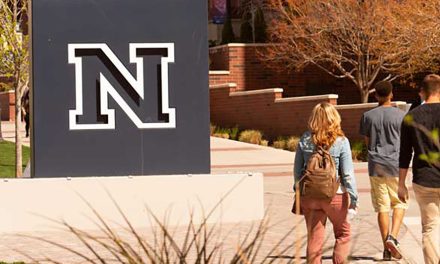
Native News Briefs | Partnership focuses on Native youth
RIVERSIDE, Calif.
On Monday Native organizations announced a tri-state partnership with Sherman Indian High to increase voter registration and civic engagement among young Native Americans.
The Las Vegas Indian Center, California Native Vote Project and the National Congress of American Indians are partnering with the “Every Native Vote Counts” campaign.
This coalition is focusing on outreach, education and coalition-building with the fastest growing American Indian and Alaska Native demographic: Native youth.
The announcement came ahead of National Voter Registration Day on Tuesday.
Coalition leaders chose Sherman Indian High as a key partner because the school specifically serves Native youth.
All students attending the school are enrolled tribal citizens and the school serves youth from more than 76 federally recognized Tribal Nations.
Las Vegas Indian Center, a nonprofit Native advocacy and services center, based in Las Vegas, Nevada, believes that young people are already becoming key voices in some of the most important issues of our time.
The California Native Vote Project believes that today’s Native youth will be the recipients of any progress from plans being carried out now.
NCAI President Fawn Sharp, who serves as the Native Vote campaign ambassador, said she believes focusing on youth is an investment in the future.
To kick off the partnership, the coalition hosted a voter engagement event for high school seniors.
Information: www.nativevote.org
Boarding school coalition launches ‘7 for 7’ campaign
MINNEAPOLIS – On Sept. 13 tribal and congressional leaders from across the country came together virtually to support the launch of “7 Weeks of Action for 7 Generations,” a national campaign led by the National Native American Boarding School Healing Coalition.
For over a decade, the coalition has worked to understand and confront the ongoing trauma created by the U.S. Indian boarding school policy.
Tuesday’s announcement is a critical step to building upon this movement and compelling the federal government to take accountability for the policy’s era.
The virtual event also featured advocates and boarding school survivors from across the country.
The tone and candor of the event were clear – the time for healing is now, and Indian Country is calling on Congress to approve the Truth and Healing Commission on Indian Boarding School Policies Act.
Deborah Parker, Tulalip, chief executive officer of the coalition, said, “We heard from elected leaders and our relatives that survived this traumatic period of American history. We deserve to know the truth, to know justice, and to continue our healing.”
Among the speakers of the virtual launch was Dallas Goldtooth, Mdewakanton Dakota and Diné, who said, “I have four grandmothers who all went to boarding school. My mother’s mother was raised by a system that didn’t teach love. And my mother experienced that.
“I experienced that as an effect,” he said. “So it is essential for us to dive into what that means and how that impacts us.”
NCAI announces new executive director
WASHINGTON, D.C. – The National Congress of American Indians recently announced Larry Wright Jr., Ponca Tribe of Nebraska, is the new executive director.
Wright, a former tribal chairman of 11 years, has been serving as the acting executive director at NCAI in addition to his role as director of leadership engagement for the organization.
Wright is a military veteran who brings with him a diverse background in education, management, and entrepreneurship.
As executive director, Wright will be responsible for managing the day-to-day operations of the organization and creating a strategic pathway to long-term success for NCAI and the NCAI Fund. He will report directly to the NCAI Executive Committee.
Fawn Sharp, NCAI president, said, “He is a familiar face to many after having served as chairman of the Ponca Tribe of Nebraska for more than a decade and serving as a board member of several tribal organizations across the country – including NCAI.”
Before joining NCAI’s staff, Wright represented the Great Plains Region as the area vice president for the NCAI Executive Committee.
In addition, he served as a board member for the National Indian Health Board, chairman of the Nebraska Commission on Indian Affairs Board of Directors, and chairman of the Nebraska Inter-Tribal Coalition.
He previously served as a secondary social studies teacher in Lincoln, Nebraska Public Schools and owned a general contracting business.
New members named to Center for Indian Country Development Leadership Council
MINNEAPOLIS – The Center for Indian Country Development?based at the Federal Reserve Bank of Minneapolis has welcomed five new members to its Leadership Council:
• Nicole Borromeo, executive vice president and general counsel, Alaska Federation of Natives.
• Shannon Edie, executive director, Native Hawaiian Organizations Association.
• Leonard “Lenny” Fineday, secretary/treasurer, Leech Lake Band of Ojibwe.
• Richard “Rico” Frias, executive director, NAFOA.
• Jean Swift, interim chief financial officer, Mashantucket Pequot Tribal Nation.
CICD is a national research and policy institute working to advance the economic prosperity of Indigenous communities and Native nations.
In 2022 CICD announced an expansion to address research and data needs made clear by the pandemic and related economic impacts.
The Federal Reserve Bank of Minneapolis is one of 12 regional Reserve Banks that, with the Board of Governors in Washington, D.C., make up the Federal Reserve System, the nation’s central bank.
The Minneapolis bank is responsible for the Ninth Federal Reserve District, which includes Montana, North and South Dakota, Minnesota, northwestern Wisconsin, and the Upper Peninsula of Michigan.
Cultural center hosts groundbreaking
ALBUQUERQUE – The Indian Pueblo Cultural Center held a groundbreaking ceremony for a makerspace facility, the first structure of the Entrepreneur Complex, on Wednesday.
The 7,500 square-foot facility will house a commercial kitchen, where entrepreneurs can develop food businesses, and a produce wash and processing line that can accommodate farmers’ needs for a place to prepare produce for distribution.
The entire three-acre complex will be located on the northwest end of the IPCC campus.
Total project cost is $8 million with approximately $5 million raised to date.
Grants and contributions from private, local, tribal, state, and federal organizations are the primary funding sources thus far. A capital campaign kicks off later this year.
The facility is part of a phased approach that will include a hoop house, an expanded farm and garden space, and incorporate two other existing buildings.








 Highway 264,
Highway 264, I-40, WB @ Winslow
I-40, WB @ Winslow